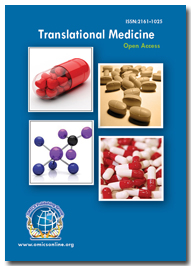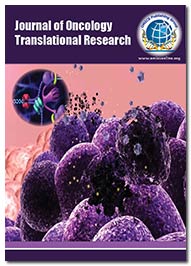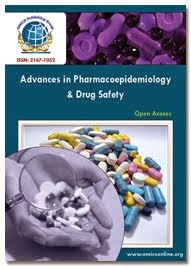Theme: New Horizons in Translational Research
Translational Medicine 2017
Translational Medicine-2017 conference will focus on the latest and exciting innovations in all areas of research offering a unique opportunity for investigators across the globe to meet, network, and perceive new scientific innovations. Translational Medicine is a science because it's based in research originated production. It is a process which leads from evidence based medicine to sustainable solutions for public health problems".
Why to attend???
The Translational Medicine conferences organized by ConferenceSeries Ltd aims to bring together leading academic scientists, researchers and research scholars to exchange and share their experiences and research results about all aspects of Translational Medicine. It also provides the chance for researchers, practitioners and educators to present and discuss the most recent innovations, trends, and concerns, practical challenges encountered and the solutions adopted in the fields of translational medicine.
Translational Medicine-2017 is an international platform for presenting research about diagnosis, prevention and management and exchanging ideas about it and thus, contributes to the dissemination of knowledge in translational medicine for the benefit of both the academia and business.
This translational medicine workshops also welcomes the participation of Presidents, CEO’s, Delegates and industrial executives from Pharma and Health care sectors making the conference a perfect platform to network, share views and knowledge through interactive keynote, plenary, poster and B2B discussions.
The organizing committee of this medicinal meeting is gearing up for an exciting and informative conference program including plenary lectures, symposia, workshops on a variety of topics, poster presentations and various programs for participants from all over the world. We invite you to join us at the Translational Medicine-2017, where you will be sure to have a meaningful experience with scholars from around the world. All members of the Translational Medicine-2017 organizing committee look forward to meeting you in San Antonio, USA.
Targeted Audience:
Translational Research Associates
Clinical Researchers
Oncologists
Haematologist
Immunologists
Clinicians
Students
Track-1: Biomarkers in Translational Medicine
Translational medicine is the emerging discipline involving the translation of laboratory findings into the design and implementation of early-stage clinical trials.TM focuses on translating pre-clinical data from in vivo, in vitro, and in silicon research into the clinic to help design trials, determine methods and choose the biomarkers. Biomarkers play a vital role in the development and growth of translational medicine. Predictive biomarkers are the markers which can be used to identify subpopulations of patients who are most likely to respond to a given therapy.
Biomarkers in clinical drug development enable continued clinical development of drugs suspected of human irrelevant animal toxicities– ensuring patient safety, reducing drug failures and loss of time. A genomic biomarker is a measurable DNA or RNA characteristic that is an indicator of normal biologic processes, pathology diagnosis and response to therapeutic or other interventions. Ex: Cancer Biomarker Specific and sensitive mRNA biomarkers are used for the identification of skin in ‘touch DNA’ evidence.
Track-2: Translational Research in Blood Disorders
People may be affected by many different types of blood conditions and blood cancers. Common blooddisorders include anemia, Clotting and bleeding disorders such as hemophilia blood clots, and blood cancers such as leukemia, lymphoma, and myeloma. Clinical research emphasize the paradox that both anemia and transfusion are associated with organ injury and increased morbidity and mortality across a wide span of disease states and surgical interventions. Among the other blood disorders. Leukemia is the most common form of cancer in children, affecting about 3,000 children each year in the United States, accounting for about 30 percent of childhood cancers.
Functional and translational genomic sequencing will be used to investigate mechanisms of globin gene regulation and proteomics to study the red blood cell membrane function in health and disease. A blood and marrow transplant replaces a person's abnormal stem cells with healthy ones from another person (a donor). This procedure allows the recipient to get new stem cells that work properly.
Track-3: Translational Cardiology and Vascular Medicine
The goal of the Cardiac translational research is to accelerate translation of promising new fundamental research discoveries for the treatment of heart failure and arrhythmias through well-designed clinical trials that demonstrate efficacy and safety. Vascular medicine encompasses many different disease states. As the field of vascular medicine evolves, the scope of diseases being treated changes. Cardiac remodeling refers to the changes in size, shape, structure and physiology of the heart after injury to the myocardium. The injury is typically due to acute myocardial infarction. To characterize the increase in lipoprotein translation by hypothyroidism, adipocytes were prepared from control and hypothyroid rats. Whereas LPL synthesis was higher in hypothyroid adipocytes, with no change in mRNA levels, there was no increase in hormone-sensitive lipase (HSL) synthesis.
To determine whether a transacting translation regulatory factor was present, a cytoplasmic fraction was prepared from control and hypothyroid adipocytes, and added to an in vitro translation system containing the hLPL mRNA. Clinical outcomes with non-biologic therapy, given early in the course of the disease, are as good as with biologic therapies. Combinations of treatments are usually required to achieve rapid and sustained remission.
Track-4: Translational Therapeutics and Technologies
As Project moves from the research phase into the development, true technology transfer needs to take place. Therapeutic angiogenesis is an experimental area of treatment of ischemia, the condition which associated with decrease in blood supply to certain body organs. Hepatocellular carcinoma (HCC) is a common solid cancer and the third most frequent cause of cancer-related mortality worldwide Molecular targeted therapies are used for treating HCC.
Recent advances of biological drugs have broadened the scope of therapeutic targets for a variety of human diseases. This holds true for dozens of RNA-based therapeutics currently under clinical investigation for diseases ranging from genetic disorders to HIV infection to various cancers. Proteomics has the ability to interrogate a variety of bio specimens for their protein contents and accurately measure the concentrations of these proteins. Deciphering DNA sequences is essential for virtually all branches of biological research.
Track-5: Translational Modeling of Efficacy and Safety
Animal and Translational Models for CNS Drug Discovery combines the experience of academic, clinical and pharmaceutical neuroscientists in a unique collaborative approach to provide a greater understanding of the relevance of animal models of neuropsychiatric disorders and their role as translational tools for the discovery of CNS drugs being developed for the treatment of these disorders. Translation models describe the mathematical relationship between two or more languages. We call them models of translational equivalence because the main thing that they aim to predict is whether expressions in different languages have equivalent meanings.
The goal of translational research is to advance basic research and new technology toward clinical utility. Molecular diagnostics focuses primarily on nucleic acids. Rapid advances in molecular diagnostics both enable basic research and result in clinical diagnostic tests. The aim of translational research is to take the outcomes and innovations developed within the research context into clinical practice. A prototype is an early sample, model, or release of a product built to test a concept or process or to act as a thing to be replicated or learned from. Prototyping is the design verification phase of Product Development -- used to demonstrate or prove aspects of a design. Prototyping is simply taking the design from the virtual, imaginary realm into the physical world.
Track-6: Clinical Epidemiology
Epidemiology is the science that studies the patterns, causes, and effects of health and disease conditions in defined populations. The Clinical Epidemiology area of interest is the largest of the 12 areas of interest in the department of epidemiology. The Institute of Circulatory and Respiratory Health supports research into causes, mechanisms, prevention, screening, diagnosis, treatment, support systems, and palliation for a wide range of conditions associated with the heart, lung, brain (stroke), blood, blood vessels, critical care and sleep. Emergency medicine is a medical specialty involving care for adult and pediatric patients with acute illnesses or injuries that require immediate medical attention.
The advent of ever more sophisticated molecular manipulation techniques has made it clear that cellular systems are far more complex and dynamic than previously thought. At the same time, experimental techniques are providing an almost overwhelming amount of new data. The computational modeling is increasingly apparent that linking molecular and cellular structure to function will require the use of new computational tools. Many pregnancies have led to maternal mortality and maternal morbidity Maternal-fetal medicine (MFM) is the branch of obstetrics that focuses on the medical and surgical management of high-risk pregnancies.
Track-7: Translational of Animal Models to Clinic
Pre-clinical studies using animal models play a very important role in the evaluation of efficacy and safety of new medical diagnostic devices before their use in human clinical studies. It provides an overview of the emerging role, results of pre-clinical studies and development, and evaluation of animal models for percutaneous cardiovascular intervention technologies for patients with symptomatic cardiovascular disease such as cardiac arrest or coronary heart disease. One prominent explanation is flawed preclinical research, in which the use and outcome of animal models is pivotal to bridge the translational gap to the clinic. Therefore, the selection of a validated and predictive animal model is essential to address the clinical question. In this review, the current challenges and limitations of animal models are discussed, with a focus on the fit-for-purpose validation.
Animal models are essential for translation of drug findings from bench to bedside. Hence, critical evaluation of the face and predictive validity of these models is important. Reversely, clinical bedside findings that were not predicted by animal testing should be back translated and used to refine the animal models. The translation of findings from bench to clinically relevant therapies is very complex. In fact, despite a full preclinical and clinical trial package, the large majority of drugs with initial phases based on translational-laboratory based discoveries actually fail to complete the development process. A lack of efficacy, side-effects, inappropriate doses, and pharmacokinetics are just a few of the various reasons for this failure.
Track-8: Translational Oncology
Cancer remains the number two cause of disease-related mortality in the United States and worldwide. The molecular analysis of tumors has revealed significant variation in the pathways that drive tumor growth and metastasis. Translational Oncology is concerned with the diagnosis of cancer (pathology), Therapy (e.g. surgery, chemotherapy, radiotherapy and other modalities), Follow-up of cancer patients after successful treatment, Palliative care of patients with terminal malignancies. Oncology depends on diagnostic tools like biopsy or removal of bits of the tumor tissue and examining it under the microscope. Other diagnostic tools include endoscopy for the gastrointestinal tract, imaging studies like X-rays, CT scanning, MRI scanning, ultrasound and other radiological techniques, Scintigraphy, Single Photon Emission Computed Tomography, Positron emission tomography and nuclear medicine techniques etc.
Cancer is a genetic disease caused by the progressive accumulation of mutations in critical genes that control cell growth and cell differentiation. Completion of the Human Genome Project promises to revolutionize the practice of Medicine, especially genetic oncology care. The tremendous gains in the knowledge of the structure and function of human genes will surely impact the diagnosis, prognosis and treatment of cancer. Translational research also describes the process of moving knowledge obtained from clinical trials into a wider community or practice setting.
Track-9: Immunology and Infectious Diseases
Clinical immunology is the study of diseases caused by disorders of the immune system (failure, aberrant action, and malignant growth of the cellular elements of the system). It also involves diseases of other systems, where immune reactions play a part in the pathology and clinical features. Many components of the immune system are actually cellular in nature and not associated with any specific organ but rather are embedded or circulating in various tissues located throughout the body. Immunotherapy is a new class of cancer treatment that works to harness the innate powers of the immune system to fight cancer. Because of the immune system's unique properties, these therapies may hold greater potential than current treatment approaches to fight cancer more powerfully, to offer longer-term protection against the disease, to come with fewer side effects, and to benefit more patients with more cancer types.
Scientists believe that for most people, Alzheimer's disease results from a combination of genetic, lifestyle and environmental factors that affect the brain over time. In Parkinson’s disease, cells that produce dopamine start to die. Dopamine is a chemical that helps you move normally. There is no known direct cause of Parkinson’s. One theory is that it may be hereditary. Other theories say exposure to pesticides and living in rural communities may cause it. he Human Immunodeficiency Virus (HIV) has infected approximately 1.5 million people in the United States. Type 1 translation research (basic research, methods development, and efficacy trials) has yielded multiple efficacious behavioral HIV prevention programs. Type 2 translation research (dissemination and effectiveness studies) has been less prevalent or successful.
Track-10: Advances in Translational Medicine
Translational Medicine seeks to translate biological and molecular knowledge of disease and how drugs work into innovative development strategies that reduce the cost and increase the speed of delivering new medicines to the patients. Whole genome sequencing should not be confused with DNA profiling, which only determines the likelihood that genetic material came from a particular individual or group, and does not contain additional information on genetic relationships, origin or susceptibility to specific diseases.
A biomedical science is a broad field that encompasses a number of disciplines. The branch of biomedical sciences that involves the use of genetic information to cure a disease is called gene therapy. Cytogenetic and Cheminformatics along with gene therapyare the emerging areas in the biomedical research. The National Institutes of Health (NIH) is the world's largest biomedical research agency, with a 75-year record of responding to the nation's key medical challenges. Today, medical science is entering a revolutionary period marked by a shift in focus from acute to chronic diseases, rapidly escalating health care costs, a torrent of biological data generated by the sequencing of the human genome, and the development of advanced high-throughput technologies that allow for the study of vast molecular networks in health and disease.
Importance & Scope
Translational medicine is a rapidly growing discipline in biomedical research and aims to expedite the discovery of new diagnostic tools and treatments by using a multi-disciplinary, highly collaborative; "bench-to-bedside" approach. Within public health, translational medicine is focused on ensuring that proven strategies for disease treatment and prevention are actually implemented within the community
Science Translational Medicine publishes articles containing original, science-based research that report successful progress toward improvements in clinical medicine Included within the scope are a broad array of traditional medical specialties including (but not limited to) cardiovascular medicine, cancer, immunology, neurology, psychiatry, metabolic diseases, radiology and imaging. Approaches applicable to all stages of the translational process are appropriate: bioengineering, drug discovery, diagnostics, biomarkers, pharmacokinetics, drug delivery, gene therapy and regenerative medicine.
Members Associated with Translational Research
Worldwide growth event has expanded from 12.7 million new cases in 2008 to 14.1 million in 2012, and it is normal that the rate will ascend by around 70% throughout the next two decades.
The National Centre for Advancing Translational Sciences (NCATS) at the National Institutes of Health (NIH). NCATS involves incorporation of 5 existing programs that have a $720 million annual budget. NCATS was formed in order to focus on the development of innovative strategies to overcome identified bottlenecks in new drug development that currently take 13 years and cost over $1 billion dollars. The current approach relies on NIH-funded scientists to make basic science discoveries and compliment industries efforts to develop and capitalize on new therapies.
More recently, the Medical Research Council (MRC), UK in the year 2007 came out with Guidelines for accelerating the translation of Medical Research. Approximately 50 members of MRC’s community including industry and representatives from the Health Departments came together in February 2007 to discuss these issues. Delegates discussed the translational research process, MRC’s role and what more MRC could do.
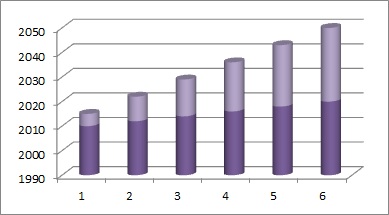
Major Associations and Societies
- Association for Clinical and Translational Sciences
- International Society for Cardiovascular Translational Research
- Central Society for Clinical and Translational Research
- European Society for Translational Medicine
- CHI Institute for Research and Innovation( Centre for Translational Research)
- Johns Hopkins Institute for clinical and Translational Research
The Catholic Health Initiatives (CHI) Centre for Translational Research (CTR) provides fully consented bio specimens and clinical data to researchers, facilitating the development of next-generation drugs, diagnostics and devices. Our state-of-the-art research facility and biorepository, coupled with our 100+ hospital network and three academic medical centres, is here to support your discovery, preclinical and product development programs.
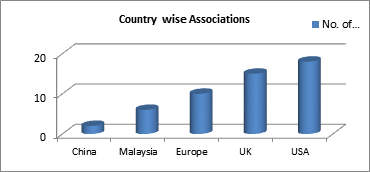
Industries and Translational Medicine
Traditionally, basic research has been separated from the clinical practice of medicine by a series of hurdles or fences. New drugs were developed independently of the clinic, and often “thrown over the fence” for safety testing and clinical trials. The move toward translational medicine is focused on removing these fences, and stimulating “bench to bedside” research. A large number of developments show the growing influence of translational medicine across academia and industry. A couple of these over the past year include a 50 million pound sterling investment by Wyeth and Scottish Enterprise in the Translational Medicine research. Many pharmaceutical companies are building translational medicine groups to facilitate the interaction between basic research and clinical medicine, particularly in clinical trials.
NIH Funding
The National Institutes of Health has awarded UW Madison’s new Institute for Clinical and Translational Research (ICTR), one of the largest grants in the history of the School of Medicine and Public Health and has identified UW-Madison as a key player in an ambitious NIH plan designed to transform the country’s clinical and translational research enterprise. With $ 41 million over five years, ICTR will aggressively address clinical and translational research in Wisconsin by first building a network of key partners from across campus and around the state including even international partners. In the UK, Collaboration across a consortium of research universities and launch of six major MRC translational medicine centres has evidenced that government also is tuning into the potential for translational medicine to overhaul medical research.
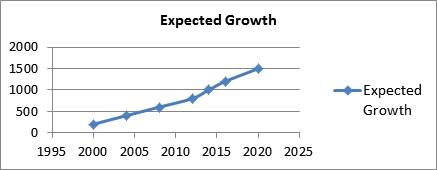
Translational Research Market
The UK has one of the excellent translational medicine (TM) systems in EU. Two types of biomedical research centres are playing critical roles for advancement of Translational research in the country i.e., Comprehensive BRCs and Specialist BRCs. These centres have boasted translation research in the country which is evident by increase in total number of clinical trials numbers i.e., 290 in 2005; have risen to more than 850 in 2009- 10.
Seventh Framework Program is a main source for research funding in EU, with a total budget of over € 50 billion (2007-2013), of which 12% was for health. FP7 gives an emphasis to projects related to translational research in infectious diseases, cancer, cardiovascular disease, diabetes/ obesity, and rare diseases.
Translational medicine is an emerging field in Austria. In the past few years, academics have undertaken initiatives for establishment of translational research infrastructure in Austria. The Austrian Science Fund (FWF) which is one of the main research funding bodies in Austria has started a translational Research Programme which is part of the BRIDGE Initiative, commissioned by the Federal Ministry for Transport, Innovation and Technology (BMVIT)
The National Centre for Advancing Translational Sciences (NCATS) at the National Institutes of Health (NIH). NCATS is the vision of NIH director Francis S. Collins and involves incorporation of 5 existing programs that have a $720 million annual budget. NCATS was formed in order to focus on the development of innovative strategies to overcome identified bottlenecks in new drug development that currently take 13 years, have a >95% failure rate, and cost over $1 billion dollars.
South Korea has a translational education focus on meeting its demand for clinical trial educational demands. The government formed Korea National Enterprise for Clinical Trials (KoNECT) which has been operating nationwide education programs for clinical trial professionals since 2008 mainly through government funds.
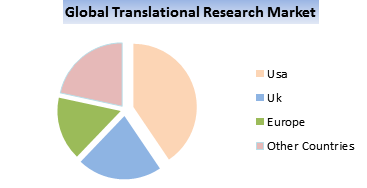
Conference Highlights
- Biomarkers in Translational Medicine
- Translational Hematology
- Translational Cardiology and Vascular Medicine
- Translational Stem Cell Research
- Translational Therapeutics and Technologies
- Clinical Epidemiology and Public Health
- Translational Pharmacology
- Immunology and Infectiuos Disease
- Clinical and Translational Oncology
- Advances in Translational Medicine
- Entrepreneurs Investment Meet
To share your views and research, please click here to register for the Conference.
To Collaborate Scientific Professionals around the World
| Conference Date | November 15-16, 2017 | ||
| Sponsors & Exhibitors |
|
||
| Speaker Opportunity Closed | |||
| Poster Opportunity Closed | Click Here to View | ||
Useful Links
Special Issues
All accepted abstracts will be published in respective Our International Journals.
- Journal of Translational Medicine
- Journal of Oncology Translational Research
- Advances in Pharmacoepidemology and Drug Safety
Abstracts will be provided with Digital Object Identifier by































